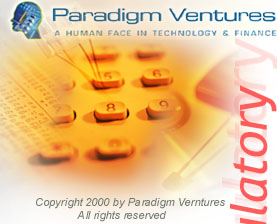Monopolies Impede EU 'Highway'
By Michael Potter, INTERNATIONAL HERALD TRIBUNE, TUESDAY, OCTOBER 3, 1995
IN London recently, a moral debate about the information superhighway was sparked when Dr. John Habgood, the Archbishop of York, warned of a "nightmare society" made up of a "lot of self-centered individuals" who occupy their day by sitting "in front of computers or television screens and soaking their minds in increasingly violent or obscene entertainment, doing their shopping by tapping on a keyboard with no need at all ever to come to terms with other people."
In fact, this is nothing but an ethereal debate - because a European superhighway does not exist.
Today, there are more than 30 million people who surf the Internet. The majority of Internet users are located in the United States, where it can be argued that the information superhighway already exists.
I believe that the information superhighway is really a way of talking about low-cost access to telecommunications services.
The United States is not dramatically more advanced in computer technology than Europe. The United Slates simply allows consumers low-cost access to technology and telecommunications services.
What has gone wrong in Europe? More than two years ago, the European Commission passed directives requiring the national regulatory authorities to set cost-based tariffs. Unfortunately, these requirements have not been imposed on the monopoly operators.
The European Commission, aware of these delaying tactics, has attempted to compensate by proposing new directives that demand full market liberalization by Jan. 1. 1998. Despite the positive intention of these efforts, effective full liberalization by 1998 is unlikely unless leadership at the national level comes forward at once.
Additionally, it is not perceived to be in the best interests of the governments that have ownership in the monopoly telephone companies -- and certainly not in the interest of the monopoly operators themselves - to prepare quickly and effectively for competition by January 1998.
Governments must be forced to sell immediately their interests in the monopoly operators to eliminate conflicts of interest and establish true independence of the national regulatory authorities. Political will is necessary to rebalance tariffs to reflect costs which may bring about higher domestic prices in certain market segments.
To create a fair and level playing field, the monopoly operators must begin technical coordination with alternative carriers immediately in order to ensure full interconnect by January 1998.
The urge of monopolistic carriers, whose focus continues to be on maximizing revenues, will be to put such coordination off until after January 1998, Even if national regulators were motivated to force the monopolies to be proactive on these critical issues, most of the regulators do not yet fully comprehend these issues. Until such coordination takes place on the Continent, an information superhighway will remain a myth.
Even if, mysteriously, these technical issues were coordinated and resolved tomorrow, there would still be a key issue that would remain unresolved: the underlying costs associated with interconnection and traffic trade.
NONE of the continental EU phone companies have complied with the EU directive that required - more than a year
and a half ago - that monopolies disclose their accounting systems and un-deriving costs. The violation of this directive makes it unlikely that accurate interconnect and services pricing will be available by January 1998.
Most EU countries have not completely or properly transposed European directives into national law as required. One notable exception is Britain.
These persistent delays in opening markets translate into higher prices and fewer services for consumers. Every day that the leadership vacuum at the national level increases, so does the gap between the reality and myth of liberalization in Europe by 1998 and a European superhighway.
At the moment, the greatest moral violation is the fact that the monopoly operators continue in overcharge users while not delivering the superhighway for which they rhetorically pay so much lip service.
MICHAEL POTTER is the director of Esprit Telecom in Amsterdam.
| 

